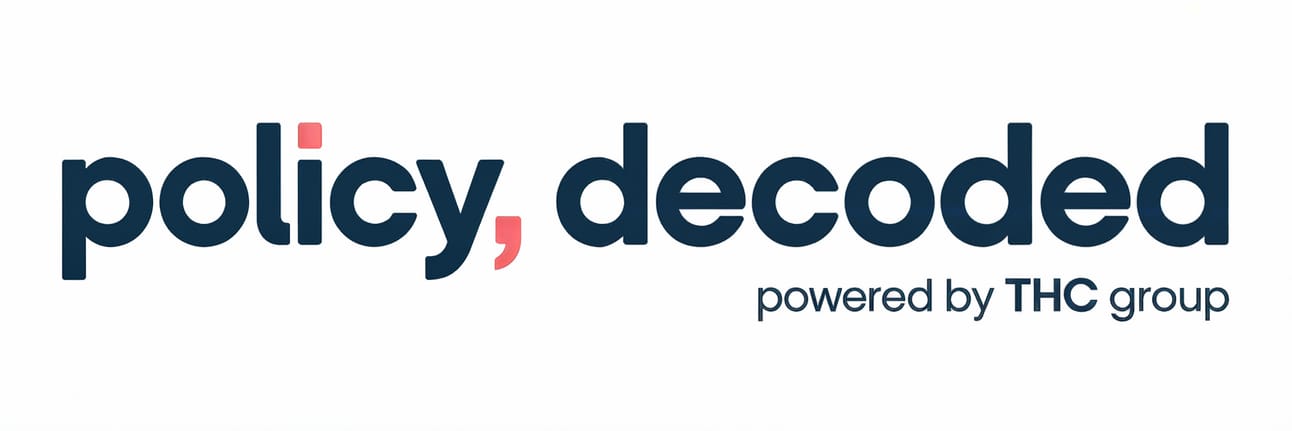Built by a former cannabis regulator, Policy, Decoded is your no-fluff, high-signal daily briefing. Trusted by operators, investors, and policymakers who can’t afford to be caught flat-footed.
Today’s brief tracks a pivotal shift: red-state momentum is outpacing Congress, and the data backing legalization is too strong to ignore. From Texas to Utah, the map is changing.
☕ Read it with your morning coffee.
📈 Reference it in your board deck.
📬 Forward it to your federal affairs team.
Start smarter. Move faster. Stay ahead.

Start here — the day’s most important development, decoded for impact.
📌 What Happened:
Texas Gov. Greg Abbott vetoed a bill that would have banned hemp-derived THC products like Delta-8 and Delta-9 gummies statewide (Houston Chronicle). The legislation had passed with bipartisan support and backing from law enforcement, public health officials, and parts of the regulated cannabis industry. Abbott’s office cited enforcement concerns and existing laws as sufficient, despite growing pressure to restrict intoxicating hemp products.
💡 Why It Matters:
The veto is a surprising pivot in a state where THC enforcement has been increasingly aggressive. Abbott’s decision not only defies political expectations but also keeps Texas aligned - at least temporarily - with more permissive interpretations of the 2018 Farm Bill. For now, retailers can continue selling hemp-derived intoxicants, but this is far from a win for the industry: the veto came with a warning that future legislative or agency action is still on the table.
🧠 THC Group Take: Don’t confuse this veto with a green light. Abbott’s rejection of the ban is more about legal strategy than policy support. Texas lawmakers are increasingly looking for enforceable, politically palatable restrictions - and the next attempt could come via administrative rulemaking or more narrowly tailored legislation. Meanwhile, the veto buys hemp operators a little more time but offers zero regulatory clarity. Brands should prepare for a fractured enforcement landscape driven by local prosecutors and health departments. If you're selling intoxicating hemp in Texas, the message is clear: you may be legal today, but you're still a target.

Fast-moving headlines, flagged for what matters.
A new Tennessee law makes it a criminal offense to sell hemp-derived cannabinoids to anyone under 21, with violators facing jail time and fines starting July 1 (WGNS Radio). The law covers Delta-8, Delta-9, and other psychoactive cannabinoids, and adds teeth to previous age restrictions by treating violations as misdemeanors. It's another sign that states are escalating penalties as part of the broader hemp crackdown.
A new Deseret News poll finds 53% of Utah voters support legalizing recreational marijuana, a sharp shift in a state once firmly opposed (Deseret News). Support is strongest among independents and younger voters, while opposition remains concentrated among Republicans and LDS members. There’s no active ballot campaign yet, but the political pressure is building.
A new report shows that adult-use cannabis legalization has generated $24.7 billion in state tax revenue since 2014, with public health data showing no corresponding rise in youth consumption across most legal states (Forbes). States like Colorado, Washington, and Oregon report flat or declining underage use, undercutting common arguments against legalization. With federal reform on the horizon and prohibitionist pressure mounting, this data strengthens the case for regulated markets, not just as an economic engine, but as a public health win.
Real estate investment trusts (REITs) focused on cannabis properties are projected to benefit from renewed industry growth in 2025, driven by M&A activity, state-level expansion, and investor reentry into the sector (Marijuana Stocks). Analysts say stabilized valuations and improving fundamentals could make cannabis REITs a sleeper win as the market regains momentum.
Gov. Greg Abbott has signed a bill expanding Texas’ medical cannabis program to include patients with chronic pain and allow access to higher THC doses under physician oversight (Marijuana Moment). The law marks a significant step for one of the nation’s most restrictive markets and could boost patient enrollment and operator participation ahead of the 2026 session.

